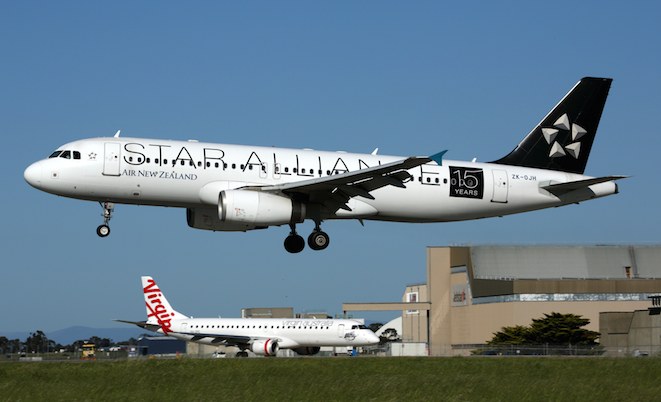
Air New Zealand and Virgin Australia say they have compiled a short-list of potential companies for the supply of commercially viable, locally produced aviation biofuel, following their request for information (RFI) process.
In March 2016, the two carriers published the RFI as part of a new partnership, hoping the size of their combined operations would offer the scale needed to kick-start large local production of aviation biofuel at a commercially viable price.
On Thursday, the trans-Tasman alliance partners said they had whittled down the 30 responses to the RFI from companies in Australia and New Zealand as well as Canada, Europe and the United States to a shortlist.
The next step was to work with those firms on “strengthening the commercial case for investment”, Virgin and Air New Zealand said in a joint statement.
Air New Zealand head of sustainability Lisa Daniell said the RFI “helped stimulate industry dialogue on the production of sustainable aviation fuel in the Australasian region”.
“Importantly, the process has also greatly expanded our understanding of the technologies and processes involved and the potential timeframes to scale up to the volumes required,” Daniell said.
Virgin Australia head of sustainability Robert Wood said the company was “optimistic about the potential of biofuel to achieve significant carbon emissions reductions in the medium-term”.
“There is clear interest and potential to produce sustainable aviation fuel in this region, and we will now undertake further detailed exploration in order to reach significant commercial scale,” Wood said.
The International Air Transport Association’s (IATA) sustainability targets seek to achieve carbon free growth by 2020 (i.e. offsetting the increase from carbon emissions from growth from 2020 onwards), and a cut to net emissions to half 2005 levels by 2050.
The aviation sector is also targeting 1.5 per cent average annual fuel efficiency improvement between 2009 and 2020.
IATA has set a target of 10 per cent alternative fuels by 2017 and aspirations to build an aircraft that produced no emissions within 50 years.
Meanwhile, in 2016 the International Civil Aviation Organisation’s (ICAO) announced a CO2 emissions standard, following six years of negotiations, where aircraft will have to meet a maximum fuel burn per flight kilometre baseline, which must not be exceeded.
The standard would apply to new aircraft designs from 2020, while new deliveries of current in-production aircraft models would be subject to the CO2 standard from 2023.
Further, the ICAO measure also recommended a cut-off date of 2028 for production aircraft that did not comply with the standard.
Air New Zealand chief of flight operations and safety officer Captain David Morgan said in the May 2016 edition of Australian Aviation the airline would like to have about 10 per cent of its total fuel use – equivalent to the Star Alliance member’s entire domestic operations – come from biofuels.
















